Growing up in Winter Park, I was surrounded by lush landscapes that sparked a love for plants and wildlife early on. As I traveled across Florida, I began to see how every yard, park, or roadside planting affects the health of our environment. That realization fueled my curiosity and led me to a career in sustainable landscaping, where I combine creativity with a deep respect for nature. Designing with nature in mind - bringing biodiversity and balance back to the landscape.
Let’s grow more resilient landscapes—Together.
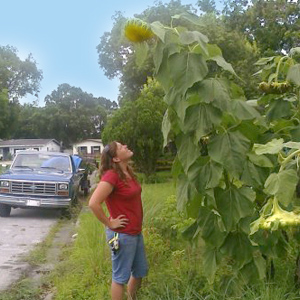
As of November 2024, I have been working on expanding Grounded Solutions by acquiring a 2.5-acre agricultural property in Orange City through a USDA Farm Ownership Loan.
My goal is to scale native plant propagation of commonly used native plants, hire greenhouse staff, and build a skilled installation and maintenance team. With expanded space, I plan to reintroduce a mobile, pop-up plant retail store for local events and farmers markets.
Stay tuned for exciting progress in 2025!
With over two decades of hands-on experience in horticulture and sustainable landscape design, I specialize in integrating native plants into residential and commercial spaces to support biodiversity, reduce resource use, and create beautiful, functional landscapes.
I began my journey in horticulture by earning a B.S. in Environmental Science with a focus on Horticultural Operations from the University of Florida. I enjoyed studying plant physiology, environmental requirements for growth, and propagation techniques. Our coursework covered plant identification, pest and disease management, and nutrient strategies essential for the healthy development of various plant species.
In June 2002, I launched AJM Environmental Services. While still a student at UF, I secured contracts with local restaurants for interior plant maintenance. After completing an internship on a large tree farm near Mt. Hood, Oregon, I continued similar work around the Portland metro area. Upon returning to Orlando, I transitioned into landscape design, installation, and maintenance. During this time, I also began research and development work with the UCF Stormwater Engineering Department. I managed the Student Union rooftop garden and collaborated with a Sanford-based roofing company to test green roof systems for both residential and commercial use. It was during this period that I discovered native plants and began growing and trialing the most resilient species for these innovative roofing systems.
In 2009, I began working as a research assistant in Winter Garden, Florida, where we trialed agricultural compounds on a wide variety of crops—including tomatoes, bell peppers, green beans, broccoli, corn, squash, potatoes, citrus, and sugarcane. Working directly in the field growing from seed and alongside operational farms gave me insight into the diverse practices of different growers and the specific needs of each crop. I quickly advanced from research assistant to principal investigator, managing studies from inception to completion. I was proud to be the first in the state to research the effects of neonicotinoids on honey bee populations. I maintained 14 hives as a registered beekeeper for about seven years.
In December 2013, I founded Grounded Solutions Inc. Having developed a deep appreciation for native plants and their ecological value, I focused my work on integrating them into modern landscapes. I began educating clients on how these plants interact with local soils, rainfall patterns, seasonal temperatures, and pollinators. I emphasize designs that are not only beautiful but also ecologically beneficial—supporting biodiversity, attracting beneficial wildlife, and reducing maintenance inputs.
I work with clients to develop sustainable maintenance routines, often through weekly or monthly garden walkthroughs. With time and experience, they learn the best practices for pruning and caring for their native landscapes. Grounded Solutions Inc. has allowed me to observe native plants thriving in a variety of conditions, helping me refine the art of creating sod-free, manicured, and functional landscapes.
As temperatures rise and rainfall patterns become more extreme, native landscaping is proving to be a practical solution for reducing dependency on fertilizers, pesticides, and irrigation. Drought-tolerant species can endure prolonged dry periods, significantly decreasing water use over time. Additionally, native landscapes reduce noise and carbon emissions from lawn equipment. By restoring food sources for pollinators and birds, we also witness a remarkable increase in natural activity and biodiversity right in our backyards.
 My first company! I became a certified wetland delineator, able to identify hydric soils, wetland plant indicators and understand the laws affecting wetland boundary identification.
My first company! I became a certified wetland delineator, able to identify hydric soils, wetland plant indicators and understand the laws affecting wetland boundary identification.
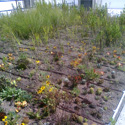 I used this knowledge to enhance residential lakefront properties, acquiring the necessary DEP permits for each site. Upland native plants were used in residential landscape design projects. I managed installation crews and designed management plans per site.
I used this knowledge to enhance residential lakefront properties, acquiring the necessary DEP permits for each site. Upland native plants were used in residential landscape design projects. I managed installation crews and designed management plans per site.
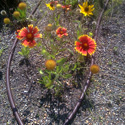 My expertise in native plant material was sought out for consultation and maintenance for LEED certified green-roof systems. I was able to install selected material on three Central Florida roof-tops with great success.
My expertise in native plant material was sought out for consultation and maintenance for LEED certified green-roof systems. I was able to install selected material on three Central Florida roof-tops with great success.
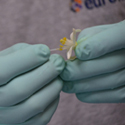 I worked as a principle investigator for field trials on agricultural crops, As a research scientist I performed applications of registered and experimental compounds on food crops, then collected time sensitive samples, environmental data, and crop assessment/evaluation figures.
I worked as a principle investigator for field trials on agricultural crops, As a research scientist I performed applications of registered and experimental compounds on food crops, then collected time sensitive samples, environmental data, and crop assessment/evaluation figures.
 In many instances, a larger crew of people assemble to assist with trial activities. Most trials performed were RAC trials and Efficacy trials. Magnitude of Residue (RAC) trials were comprised of an application then sampling for analysis of residues. Efficacy trials tested the effectiveness of newly formulated compounds against pest and weed populations.
In many instances, a larger crew of people assemble to assist with trial activities. Most trials performed were RAC trials and Efficacy trials. Magnitude of Residue (RAC) trials were comprised of an application then sampling for analysis of residues. Efficacy trials tested the effectiveness of newly formulated compounds against pest and weed populations.
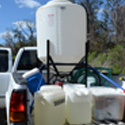 Other trials I performed included environmental fate studies for dissipation in sandy soils, bee toxicity studies around citrus tree blossoms and best practices for hand pollination in corn. I became a Fl registered beekeeper and a commercial pesticide applicator during this time.
Other trials I performed included environmental fate studies for dissipation in sandy soils, bee toxicity studies around citrus tree blossoms and best practices for hand pollination in corn. I became a Fl registered beekeeper and a commercial pesticide applicator during this time.
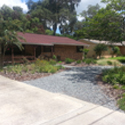 While serving as a horticulturist with Evolving Landscapes, I provided consulting for design and installation of plants, selected for the Florida Landscape. We specialized in ecosystem identification and assisting the property owner in re-developing for a native landscape.
While serving as a horticulturist with Evolving Landscapes, I provided consulting for design and installation of plants, selected for the Florida Landscape. We specialized in ecosystem identification and assisting the property owner in re-developing for a native landscape.
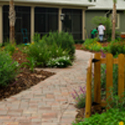 Many of our clients were interested in attracting birds, butterflies and other pollinators while enjoying a low resource intensive landscape. Concept designs, plant selection, budget development, project timelines and client coordination were vital components of each job.
Many of our clients were interested in attracting birds, butterflies and other pollinators while enjoying a low resource intensive landscape. Concept designs, plant selection, budget development, project timelines and client coordination were vital components of each job.
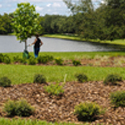 Presentations on the topics of Native landscapes and Permaculture principles were provided to garden societies for the promotion of environmentally sustainable landscapes.
Presentations on the topics of Native landscapes and Permaculture principles were provided to garden societies for the promotion of environmentally sustainable landscapes.
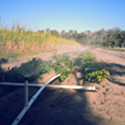 FPR is an agricultural research company, operating for almost 30 years out of Oviedo, FL. FPR evaluates the effectiveness of cultural practices, organic and synthetic compounds on various crops, diseases and pests.
FPR is an agricultural research company, operating for almost 30 years out of Oviedo, FL. FPR evaluates the effectiveness of cultural practices, organic and synthetic compounds on various crops, diseases and pests.
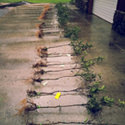 Through the sampling of leaf tissues, root systems, whole fruit, soil and water they are able to provide analytic labs with the material they need for more accurate detection of residues. No trial is complete without detailed documentation.
Through the sampling of leaf tissues, root systems, whole fruit, soil and water they are able to provide analytic labs with the material they need for more accurate detection of residues. No trial is complete without detailed documentation.
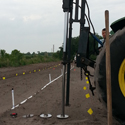 Through paper records and evaluations, statistical analysis of numbers, and database input per trial. It takes time and energy to search and research, but I thoroughly enjoyed figuring these things out.
Through paper records and evaluations, statistical analysis of numbers, and database input per trial. It takes time and energy to search and research, but I thoroughly enjoyed figuring these things out.
 I was given the opportunity to lead a community supported agriculture garden. The community garden had 12 paying members that gathered twice a week for two hours. On each Thursdays I would gather with the gardeners and collectively learn about and tend to the garden needs. Most gardens allow you to rent one plot for what you'd like to grow.
I was given the opportunity to lead a community supported agriculture garden. The community garden had 12 paying members that gathered twice a week for two hours. On each Thursdays I would gather with the gardeners and collectively learn about and tend to the garden needs. Most gardens allow you to rent one plot for what you'd like to grow.
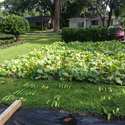 This garden allowed everyone to work together to harvest from the entire garden. This helped ensure plenty of produce and greens were available for the taking each week. As each seasonal vegetable lived it's life, we would pull and replant the expired areas and trim back and harvest the producing areas.
This garden allowed everyone to work together to harvest from the entire garden. This helped ensure plenty of produce and greens were available for the taking each week. As each seasonal vegetable lived it's life, we would pull and replant the expired areas and trim back and harvest the producing areas.
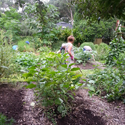 I had fun coordinating a raw chef to come in and share a few recipes strait from the garden to the plate in just a few hours. I was able to create a small cucumber trial organic fertilizer trial to see which blends worked best. A few of the gardeners enjoyed learning the process. Counting and weighing the cucumbers as they grew.
I had fun coordinating a raw chef to come in and share a few recipes strait from the garden to the plate in just a few hours. I was able to create a small cucumber trial organic fertilizer trial to see which blends worked best. A few of the gardeners enjoyed learning the process. Counting and weighing the cucumbers as they grew.
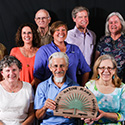 Helped host meetings and arrange for speakers to present to our local chapter
Helped host meetings and arrange for speakers to present to our local chapter
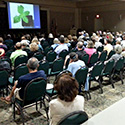 Facilitated meetings for the general public and coordinated speakers.
Facilitated meetings for the general public and coordinated speakers.
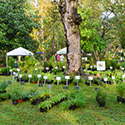 Organized, arranged, and sold plants as a chapter fundraiser for Native plant community projects and educational grants.
Organized, arranged, and sold plants as a chapter fundraiser for Native plant community projects and educational grants.